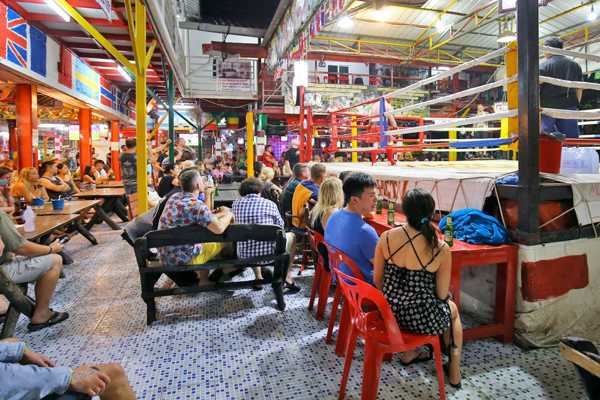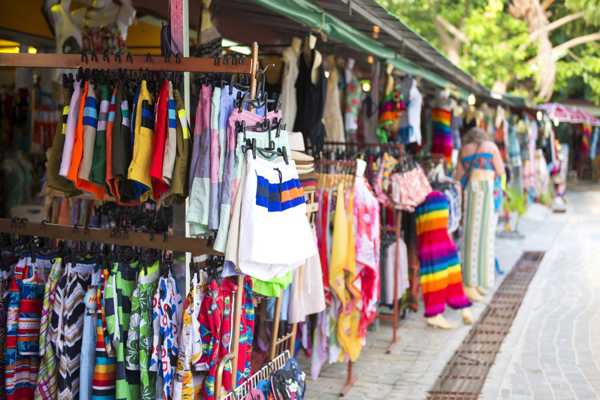The variety of Thai food in Phi Phi Island is sure to please many palates. Thai food maintains a reputation as being one of the world's most delicious and creative cuisines. The different dishes – from quick lunchtime noodles to spicy salads, soups and curries – combined with ingredients like coconut milk, lemongrass and ginger, make it a must-try. Surprisingly, it isn't always spicy; Chinese-influenced dishes are considerably calmer.
Thai food varies from region to region, depending on the local ingredients used. Southern Thailand is famous for fiery curries and fish dishes. Surrounded by the Andaman Sea and the Gulf of Thailand, there's no shortage of fish, prawn, lobster and crab. Seafood can be curried, steamed, boiled, barbecued or fried, and served with different sauces and dips. Phi Phi is the ideal place to sample them all.
Rice dishes

- Cibo
Thailand produces some of the best rice in the world. Always served plain and unsalted, it provides the perfect counterbalance to the heat of many Thai dishes. When mouths start to burn, the experienced leave the water alone and reach for rice. It’s also the perfect partner to just about any Thai dish. If you’re not eating noodles, chances are good that some form of rice will be nearby.
Khao mok gai is a Muslim speciality consisting of roast chicken on a bed of saffron rice, mixed with ginger and lightly fried garlic. Not spicy by default, but accompanied by an optional sweet hot sauce.
Khao man gai is similar, but white rice is used and the dark sauce is comprised of soybean sauce, ginger, chillies, sugar, vinegar, and soy sauce. Chicken is chicken, rice is rice, but not all sauces are created equal; a shop that does this correctly wins customers for life.
Fish is always fresh in Phi Phi and always goes well with a heaped spoonful of rice. Try fish in 3 tastes (sweet, sour, and spicy), barbecued with dips, grilled, or with garlic and ginger.
Fried rice (khao pad) is an easy fallback when you can’t decide what to eat. The Thai version of this Asian speciality uses jasmine rice and usually contains chicken, egg, garlic, onion, and tomatoes. Not to be left out of the seasoning race, Thai fried rice makes liberal use of soy and fish sauces, salt, and sugar – with chillies, sugar, and sauces also placed on the table for a personalised touch.
Noodles

- Cibo
Phad Thai is the country’s signature dish. Noodles are stir-fried with shrimp, chicken or tofu and vegetables, then topped with roasted peanuts and accompanied by condiments like sour pickle, chilli, sugar and limes. Khanom jeen is a popular Chinese breakfast of white rice noodles covered with spicy fish curry and served with a plate of fresh vegetables, herbs, and fruit.
Kuay tiew: is it a noodle dish or a soup? Both, actually. And it’s made so many different ways, with so many different kinds of noodles, and casts so many different ingredients in supporting roles that it nearly defies explanation. Generally, a clear broth is filled with the noodle of choice and delectable bits of chicken, pork, duck, beef, and vegetables.
Potrebbero interessarti anche queste attività
- Bamboo Island (Koh Russei)

Bamboo Island (Koh Russei)
Cambodia - Loh Lana in Phi Phi

Loh Lana in Phi Phi
Thailand - Phi Phi Reggae Bar

Phi Phi Reggae Bar
Thailand
Soup

- Cibo
Tom yam gung is Thailand's famous shrimp soup. The flavourful and aromatic qualities are due to the presence of galangal, kaffir lime leaves, lemongrass, and coriander. There are many varieties of tom yam, including an excellent vegetarian version.
Tom kha gai (boiled galangal chicken) steals the galangal and lemongrass from tom yam gung, throws in some chicken, and wins the distinction of being refreshing by the addition of coconut milk.
Salad

- Cibo
Som tam (papaya salad) is affectionately known as ‘papaya pok pok’ – with the pok pok being the sound of the ingredients being mashed together as the mortar and pestle do their work. This spicy salad originally from the northeast of Thailand, but it’s now a national favourite.
Made from sliced green papaya, peanuts, dried shrimp, and raw vegetables, it's usually eaten with sticky rice and fresh grilled chicken.
Fruits

- Cibo
Thais traditionally finish a meal with fruit, and the Andaman region has many locally grown varieties to choose from. From the familiar – oranges, pineapple, bananas, apples, and papaya – to the eye-popping exotics – rambutan, custard apples, langsat, and mangosteen – the quality, price, and availability of tropical fruits is astounding.
Durian is perhaps the king of tropical fruits, but many find the smell offensive – to the point that certain areas have signs prohibiting them. Guava, similar to an apple, and green mango are eaten dipped into a mix of sugar, salt, and chilli. Mango, the national fruit, is delicious, but generally only available between January to June. One last note: eating fruit also helps take out the fire of some of the more spicy dishes of Thai food!
Desserts

- Cibo
Ingredients like coconut, beans and pumpkin are used inventively in the Asian way, accompanied by shaved ice, sweetened coconut milk and palm syrup.
Many report mangos with sticky rice to be the best dessert in Thailand. Perfect after a meal, or as an in-between snack.
International food

- Cibo
Thais are very good at adapting dishes from different countries, and with the increase in tourism, there's a better knowledge of European food and cooking methods.
In the upmarket hotel restaurants, you're not likely to be disappointed in your choice. Don't however, expect great western food at the local restaurant down the road or on the beach. It's very expensive to import high-quality ingredients, so the budget-friendly options tend to serve simplified versions of foreign dishes. The taste will definitely be different from what you're used to.
Drinks

- Cibo
Beer goes well with Thai food. Local beers include Beer Chang and Singha – both have inflicted heavy hangovers on past visitors. International brands, including the occasional American beer, are also available.
Wine is relatively expensive. You can find good wines in hotels and upscale restaurants.
The availability of juicy fresh fruit in Thailand makes for some amazing fruit drinks. Favourites include freshly squeezed orange juice, coconut smoothies, and shakes with banana or pineapple.
Water for drinking comes only from bottles. Never drink from the tap. Small Thai kitchens will have water pitchers on the table – the water they contain comes from large bottles and is safe to drink.
Useful tips

- Cibo
Thais don't eat with chopsticks, except for when enjoying certain dishes (usually of Chinese origin). They eat with a spoon and fork, which makes eating rice a lot easier.
The phrase mai phet means 'not spicy'. It's a very useful phrase when you're ordering Thai food.
History of Thai food

- Cibo
Thai cuisine is a blend of centuries-old eastern and western influences which have, over time, fused to form something uniquely Thai. Whether fiery hot or sweet and sour, Thai food is about harmony and balance in the tastes and textures of the dishes.
In the past, many Thais lived by the water – and the cooking reflected it. Fish, shellfish, plants and herbs were major ingredients. Meat was rarely used and never served in large chunks, instead being shredded and laced with herbs and spices. The Chinese introduced frying, stir-frying and deep-frying, adding to the traditional cooking methods of stewing, baking, or grilling.
From the 17th century onwards, Indian, Dutch, French and Japanese culinary influences were absorbed and given a Thai twist. Portuguese missionaries introduced Thais to chillies from South America in the late 1600s, though nobody could have guessed how popular they would become.

Questo articolo include opinioni del team editoriale delle Go Guides. Hotels.com retribuisce gli autori per i loro scritti pubblicati su questo sito; i compensi possono includere spese di viaggio o di altro tipo.
Inizia a programmare il tuo viaggio
Dove soggiornare a Ko Phi Phi

SAii Phi Phi Island Village

Phi Phi Holiday Resort

Royal Lanta Resort & Spa

Coco Cape Lanta Resort

Phi Phi Relax Beach Resort

Phi Phi Natural Resort

Koh Jum Ocean Beach Resort

The Cobble Beach

Horizon Beach Resort Koh Jum

Avani+ Koh Lanta Krabi Resort
Articoli correlati
- Bamboo Island (Koh Russei)

Bamboo Island (Koh Russei)
Cambodia - Loh Lana in Phi Phi

Loh Lana in Phi Phi
Thailand - Phi Phi Reggae Bar

Phi Phi Reggae Bar
Thailand - Sunflower Beach Bar in Phi Phi

Sunflower Beach Bar in Phi Phi
Thailand - Shipwrecked Boat Tour in Phi Phi

Shipwrecked Boat Tour in Phi Phi
Thailand - Phi Phi Viewpoint

Phi Phi Viewpoint
Thailand - 9 Best Places to Go Shopping in Phi Phi Island

9 Best Places to Go Shopping in Phi Phi Island
Thailand - Breakers Bar & Grill in Phi Phi

Breakers Bar & Grill in Phi Phi
Thailand
